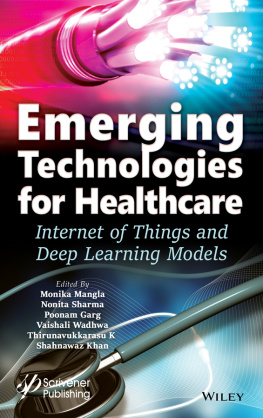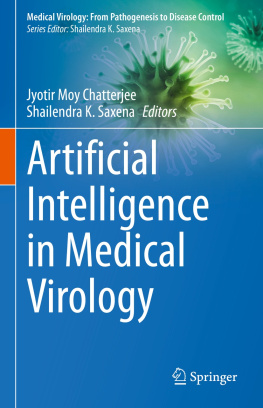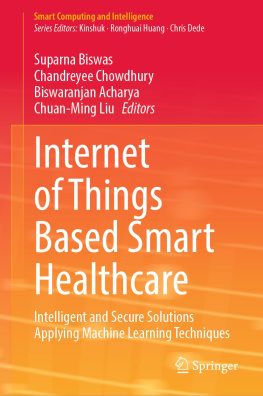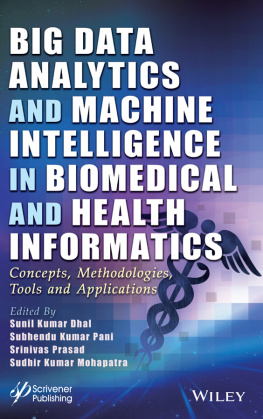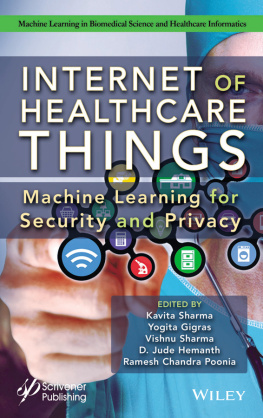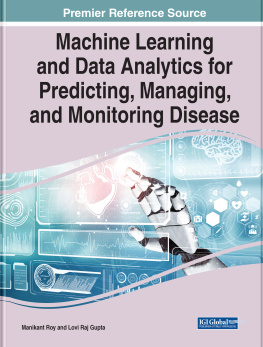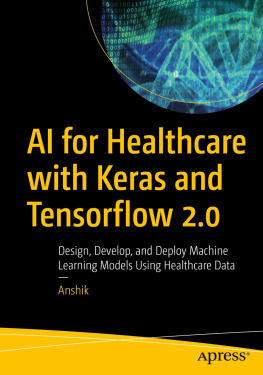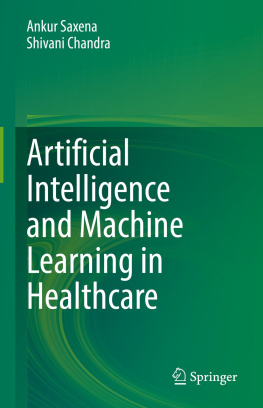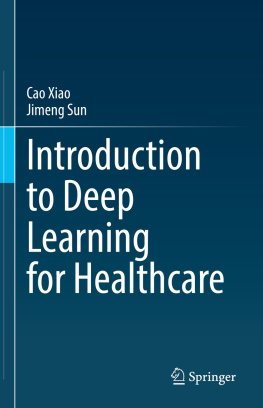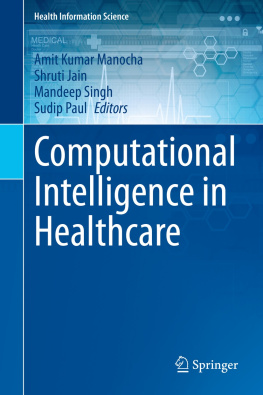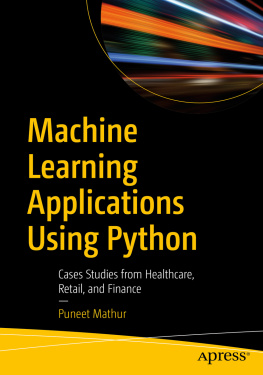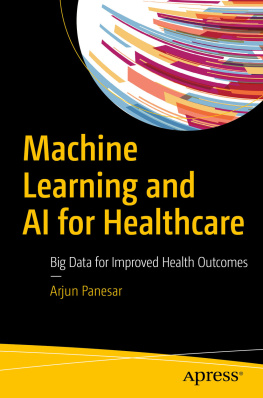
Scrivener Publishing
100 Cummings Center, Suite 541J
Beverly, MA 01915-6106
Publishers at Scrivener
Martin Scrivener ()
Phillip Carmical ()
Emerging Technologies for Healthcare
Internet of Things and Deep Learning Models
Edited by
Monika Mangla,
Nonita Sharma,
Poonam Mittal,
Vaishali Mehta Wadhwa,
Thirunavukkarasu K.
and
Shahnawaz Khan

This edition first published 2021 by John Wiley & Sons, Inc., 111 River Street, Hoboken, NJ 07030, USA and Scrivener Publishing LLC, 100 Cummings Center, Suite 541J, Beverly, MA 01915, USA
2021 Scrivener Publishing LLC
For more information about Scrivener publications please visit www.scrivenerpublishing.com.
All rights reserved. No part of this publication may be reproduced, stored in a retrieval system, or transmitted, in any form or by any means, electronic, mechanical, photocopying, recording, or otherwise, except as permitted by law. Advice on how to obtain permission to reuse material from this title is available at http://www.wiley.com/go/permissions.
Wiley Global Headquarters
111 River Street, Hoboken, NJ 07030, USA
For details of our global editorial offices, customer services, and more information about Wiley products visit us at www.wiley.com.
Limit of Liability/Disclaimer of Warranty
While the publisher and authors have used their best efforts in preparing this work, they make no representations or warranties with respect to the accuracy or completeness of the contents of this work and specifically disclaim all warranties, including without limitation any implied warranties of merchantability or fitness for a particular purpose. No warranty may be created or extended by sales representatives, written sales materials, or promotional statements for this work. The fact that an organization, website, or product is referred to in this work as a citation and/or potential source of further information does not mean that the publisher and authors endorse the information or services the organization, website, or product may provide or recommendations it may make. This work is sold with the understanding that the publisher is not engaged in rendering professional services. The advice and strategies contained herein may not be suitable for your situation. You should consult with a specialist where appropriate. Neither the publisher nor authors shall be liable for any loss of profit or any other commercial damages, including but not limited to special, incidental, consequential, or other damages. Further, readers should be aware that websites listed in this work may have changed or disappeared between when this work was written and when it is read.
Library of Congress Cataloging-in-Publication Data
ISBN 978-1-119-79172-0
Cover image: Pixabay.Com
Cover design by Russell Richardson
Set in size of 11pt and Minion Pro by Manila Typesetting Company, Makati, Philippines
Printed in the USA
10 9 8 7 6 5 4 3 2 1
Preface
The use of computing technologies in the healthcare domain has been creating new avenues for facilitating the work of healthcare professionals. Several computing technologies, such as machine learning and virtual reality, have been flourishing and in turn creating new possibilities. Computing algorithms, methodologies and approaches are being used to provide accurate, stable and prompt results. Moreover, deep learning, an advanced learning technique, is striving to enable computing models to mimic the behavior of the human brain; and the Internet-of-Things (IoT), the computer network consisting of things or physical objects in addition to sensors, software or methods, is connecting to and exchanging data with other devices. Therefore, the primary focus of this book, Emerging Technologies for Healthcare, is to discuss the use and applications of these IoT and deep learning approaches for providing automated healthcare solutions.
Our motivation behind writing this book was to provide insight gained by analyzing data and information, and in the end provide feasible solutions through various machine learning approaches and apply them to disease analysis and prediction. An example of this is employing a three-dimensional matrix approach for treating chronic kidney disease, the diagnosis and prognostication of acquired demyelinating syndrome (ADS) and autism spectrum disorder, and the detection of pneumonia. In addition to this, providing healthcare solutions for post COVID-19 outbreaks through various suitable approaches is also highlighted. Furthermore, a detailed detection mechanism is discussed which is used to come up with solutions for predicting personality through handwriting recognition; and novel approaches for sentiment analysis are also discussed with sufficient data and its dimensions.
This book not only covers theoretical approaches and algorithms, but also contains the sequence of steps used to analyze problems with data, processes, reports, and optimization techniques. It will serve as a single source for solving various problems via machine learning algorithms. In brief, this book starts with an IoT-based solution for the automated healthcare sector and extends to providing solutions with advanced deep learning techniques.
Here, we would like to take the opportunity to acknowledge the assistance and contributions of all those engaged in this project. We especially would like to thank our authors for contributing their valuable work, without which it would have been impossible to complete this book. We express our special and most sincere thanks to the reviewers involved in the review process who contributed their time and expertise to improving the quality, consistency, and arrangement of the chapters. We also would like to take the opportunity to express our thanks to the team at Scrivener Publishing for giving the book its final shape and introducing it to the public.
Editors
Monika Mangla, Nonita Sharma,
Poonam Mittal, Vaishali Mehta Wadhwa,
Thirunavukkarasu K. and Shahnawaz Khan
Part I
BASICS OF SMART HEALTHCARE
An Overview of IoT in Health Sectors
Sheeba P. S.
Department of Electronics Engineering, Lokmanya Tilak
College of Engineering, Navi Mumbai, India
Abstract
In the recent past, several technological developments have happened owing to the growing demand for connected devices. Applications of Internet of Things (IoT) are vast, and it is used in several fields including home-automation, automated machines, agriculture, finance sectors, and smart cities. Life style diseases are increasing among urban population and lot of money is spent for the diagnosis and treatment of diseases. Adaption of IoTs in health sectors enables real-time monitoring of the patients and alerts the patients for health checkups whenever required and communicate the information from time to time. During pandemic situations like Covid-19 which we are facing today, the need for IoT-enabled services in health sector is essential as the doctors have to treat the patients from remote locations. The connected devices can help in surveillance and disease control, keep track of nutritional needs, mental health, stress management, emergency services, etc., which will lead to an efficient health management system. This article gives an overview of applications of IoT in health sectors and how it can be used for sustainable development and also addresses various challenges involved in it. Efficient use of IoT in health sectors can benefit healthcare professionals, patients, insurance companies, etc.
Next page
